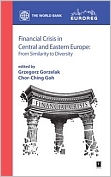| |||||
• polskie
• Zamów informacje o nowościach z wybranego tematu • kontakt |
FINANCIAL CRISIS IN CENTRAL AND EASTERN EUROPEGORZELAK G. GOH CH.wydawnictwo: SCHOLAR, 2010, wydanie Icena netto: The financial crisis of 2008–2009 has become the most serious challenge for the Central and Eastern European countries after they had completed the process of post-socialist transformation and became EU members. The negative impacts of the recession on their most important international partners multiplied their own tensions and imbalances which – in some cases – have led to a dramatic decline of the GDP and serious cuts in public spending and personal incomes.The situation within the group is far from uniform. On the one hand we have Poland – the only country in Europe that has not gone through a recession, and on the other hand there are the Baltic Republics that have lost some one fifth of their output. Also, the anti-crisis policies implemented in particular countries were strongly differentiated. Keeping in mind all these differences one may say that the New Member States, on the whole, have confronted the challenges of the crisis bravely and effectively due to their still great adaptability and flexibility of both the political elites and societies. They thus may become an example for some other EU Member States which are currently struggling with economic difficulties and strong social protests against necessary but harsh economic measures. This book contains papers presented at a World Bank-sponsored seminar that was held in Warsaw in September 2009, when the crisis still was in full swing. The authors reflect on the general dimensions of the crisis and also report on situations in particular Central and Eastern European countries, and in the group as a whole.
INTRODUCTION 292 pages, Paperback
Po otrzymaniu zamówienia poinformujemy pocztą e-mail lub telefonicznie, |


